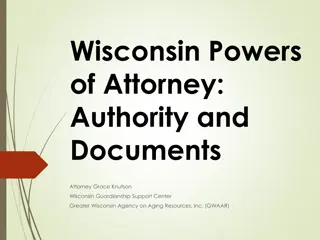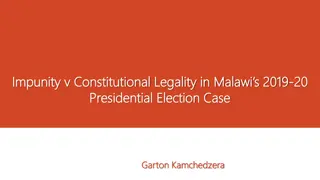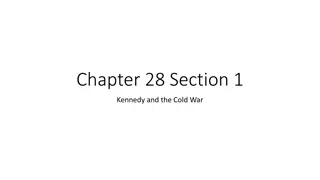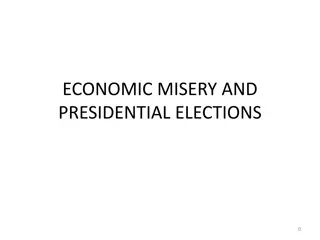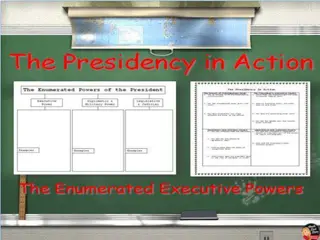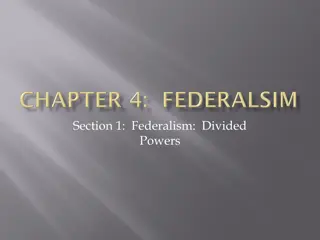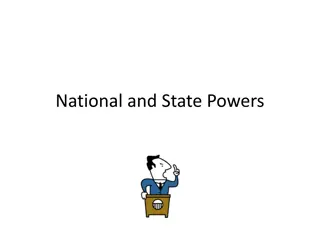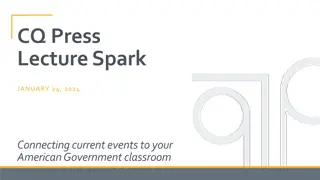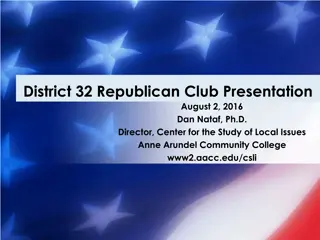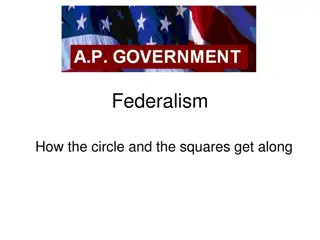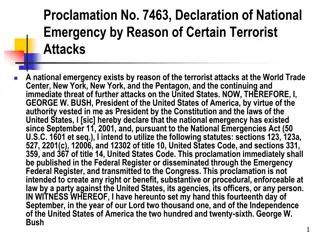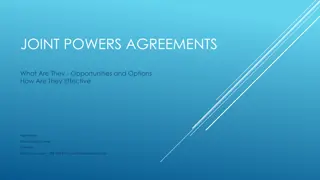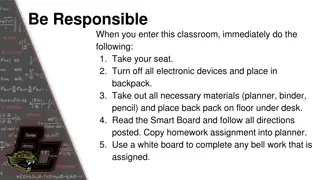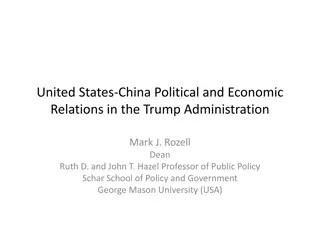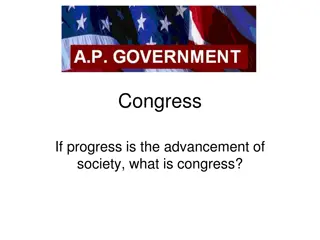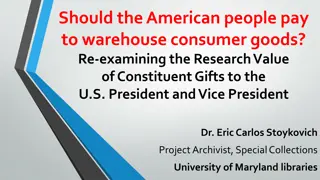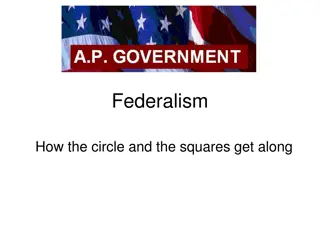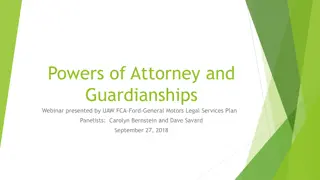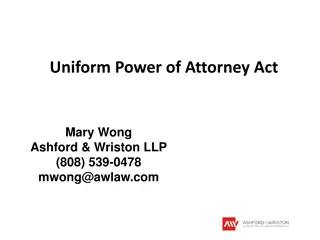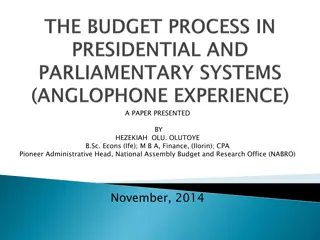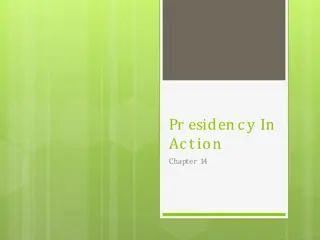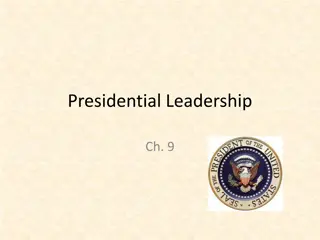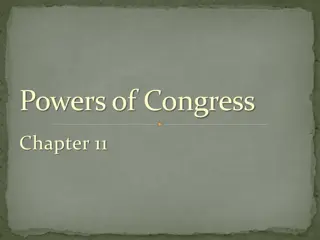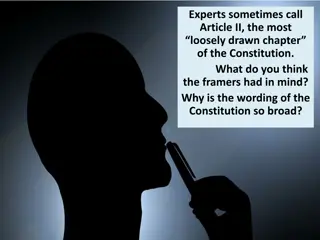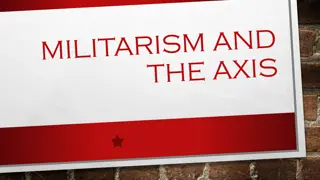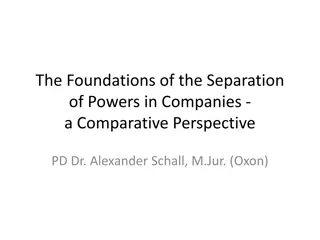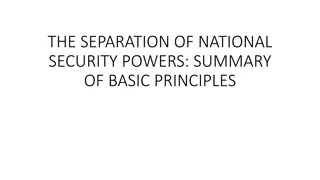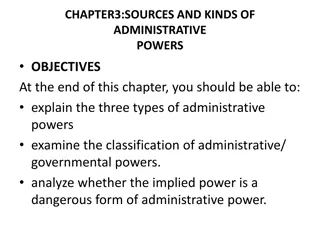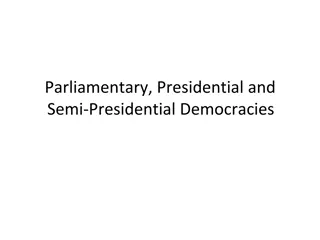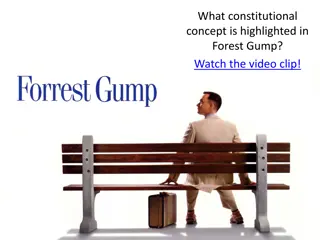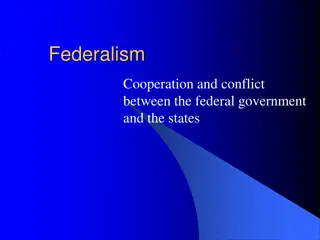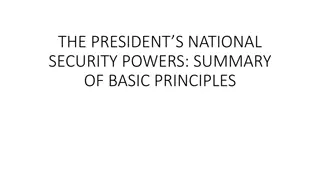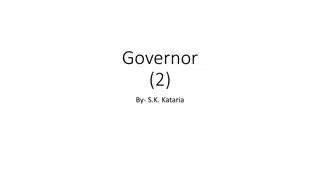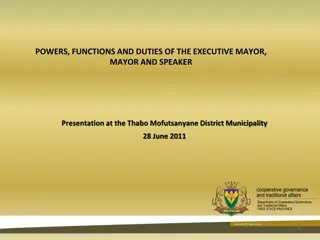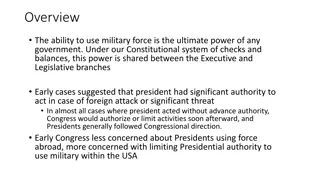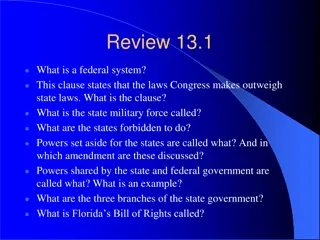READ⚡[PDF]✔ Emerging Space Powers: The New Space Programs of Asia, the Middle Ea
\"COPY LINK HERE ; https:\/\/getpdf.readbooks.link\/B004NNUV54\n\n[READ DOWNLOAD] Emerging Space Powers: The New Space Programs of Asia, the Middle East and South-America (Springer Praxis Books) | Emerging Space Powers: The New Space Programs of Asia, the Middle East and South-America (Springer Pra
1 views • 6 slides
Understanding Police Powers on the Street Webinar
Explore the powers and procedures of police officers on the street in this informative webinar featuring Sophie Leaver, a Police and Administrative Law Solicitor from Redfern Legal Centre. Topics covered include where police derive their powers, identity requests, personal searches, complaints proce
4 views • 44 slides
Understanding Wisconsin Powers of Attorney: Core Concepts and Types
Explore the essential concepts of powers of attorney in Wisconsin, including self-determination, legal documentation, next of kin laws, and types such as health care and finance powers. Learn about the authority granted to agents and the implications of durable power of attorney.
0 views • 51 slides
Impunity vs. Constitutional Legality in Malawi's 2019 Presidential Election Case
Explore the conflict between impunity and constitutional legality in Malawi's 2019 Presidential Election case. The concept, approach, and argument related to allopoietic law implementation, interpretative inquiry, and rejection of mediocrity are discussed in detail. The battle against impunity and m
0 views • 10 slides
Kennedy and the Cold War: A Presidential Election and New Strategies
Kennedy's victory over Nixon in the 1960 presidential election paved the way for new Cold War strategies. Despite differences in upbringing, Kennedy's televised debate win and swift actions during unexpected events secured his narrow victory. With a focus on enhancing the nation's armed forces, Kenn
0 views • 17 slides
Insight into Economic Misery and Presidential Elections
Exploring the relationship between economic indicators like unemployment rate, inflation rate, and real GDP, and their impact on presidential elections. Discusses the Misery Index, real GDP per capita growth rule, and effective economic rules that influence election outcomes.
5 views • 4 slides
Understanding the Presidency: Powers and Views
The Presidency in Action explores the enumerated executive powers and the growth of presidential power, reflecting on how different Presidents view and exercise their authority. It delves into the broad versus strict views of the office, the foundation of executive power in Article II of the Constit
0 views • 20 slides
Understanding Federalism: Divided Powers and Constitutional Framework
Federalism is a system where powers are divided between a central government and regional entities. It involves delegated, reserved, exclusive, and concurrent powers outlined in the Constitution. The supremacy of the Constitution is pivotal in establishing a unified federal government.
0 views • 5 slides
Understanding National and State Powers in the United States
The Constitution grants specific powers to the national government, including expressed, implied, and inherent powers. States have reserved powers, and there are concurrent powers shared by both levels of government. The Supremacy Clause ensures that national laws take precedence over state laws. Ex
0 views • 13 slides
A Comprehensive Guide To Safety and Confidentiality With Presidential Charters
Learn about the unparalleled safety and confidentiality features of presidential charters in London. This comprehensive guide provides insights into the elite services tailored for high-profile travelers.
0 views • 1 slides
Analysis of Presidential Race Shift to New Hampshire
The Republican presidential race has moved to New Hampshire following the Iowa caucuses, with former President Trump showcasing strong momentum. Nikki Haley emerges as a prominent challenger, while DeSantis suspends his campaign. The significance of Iowa and New Hampshire in the nomination process i
0 views • 5 slides
Analysis of 2016 Presidential Election: Polling, Match-ups, and Voting Intentions
Presentation by Dr. Dan Nataf at the District 32 Republican Club focused on the 2016 Presidential Election. It covers current state of the race, polling data, hypothetical match-ups between candidates like Trump, Clinton, and Sanders, favorability ratings, voting intentions in the primaries, and gen
0 views • 36 slides
Understanding Federalism in the United States
Federalism in the United States involves the relationship between the federal government and state governments, with terms such as delegated powers, reserved powers, concurrent powers, and the Elastic Clause playing key roles. The aftermath of events like Hurricane Katrina and policies such as No Ch
0 views • 30 slides
Understanding National Emergency Declarations and Emergency Powers Laws
This content delves into the legal aspects of national emergency declarations, emergency powers laws, and judicial review of emergency declarations. It covers the purpose, termination, historical context, congressional oversight, and impact on presidential powers. It also explores the complexities o
0 views • 6 slides
Understanding Joint Powers Agreements: Opportunities, Options, and Effectiveness
Joint Powers Agreements (JPAs) enable public agencies to collaborate efficiently, providing services and facilities in line with various factors. Idaho Code outlines the purposes, definitions, and powers that can be jointly exercised. This legal framework facilitates cooperation among entities, alth
0 views • 34 slides
Classroom Guidelines for Lesson on Properties of Exponents
Follow the classroom guidelines for this lesson on Properties of Exponents. Learn about the rules of exponents, how to simplify expressions, and complete bell work matching equations with properties. Homework includes worksheets on horse-breeding and dog eating table scraps. Understand product, quot
0 views • 10 slides
US-China Relations in the Trump Administration: Unilateral Presidential Actions and Congressional Dynamics
The article discusses the evolving US-China political and economic relations during the Trump administration, focusing on unilateral presidential actions, Congress's role, and the influence of the federal courts. It highlights President Trump's aggressive trade agenda, challenges to his reliance on
0 views • 24 slides
Understanding the Role and Structure of Congress in the US Government
Congress, as the legislative branch of the US government, plays a vital role in advancing society by making laws and representing the interests of the American people. Founded with intentions to balance powers and represent states of different sizes, Congress is divided into the House of Representat
0 views • 32 slides
Reconsidering the Cost of Warehousing Presidential Gifts: Research Insights
Examining the research value of constituent gifts to the U.S. President and Vice President, Dr. Eric Carlos Stoykovich questions if the American people should pay to warehouse consumer goods. This analysis delves into the storage costs, online representation, and rare vs. commonplace gifts in presid
0 views • 7 slides
Understanding Federalism: Powers, Relationships, and Key Terms
Explore the concept of Federalism through the relationship between the federal government (circle) and state governments (squares). Discover the powers involved such as Delegated, Reserved, Concurrent, and Prohibited powers. Delve into significant cases like McCulloch v. Maryland, terms like the Ela
0 views • 28 slides
Understanding Powers of Attorney and Guardianships Presentation
This presentation covers important aspects of Powers of Attorney and Guardianships, including types of powers of attorneys, when they are needed, who should be given power of attorney, responsibilities if named as an attorney, and considerations regarding revocation. It also discusses the need for g
0 views • 11 slides
Understanding the Uniform Power of Attorney Act and Hawaii Act 22
Explore the significance of the Uniform Power of Attorney Act and Hawaii Act 22 regarding Powers of Attorney, termination of agent's authority, general powers granted, and more. Learn about the legal document granting authority to act on behalf of a principal and the termination clauses that may be
0 views • 22 slides
Comparative Analysis of Presidential and Parliamentary Budgeting Systems in Anglophone Countries
The paper delves into the intricacies of the Presidential and Parliamentary systems of budgeting, highlighting the importance of budget as an economic policy tool. It compares the budgeting systems of Anglophone countries, emphasizing the roles of the executive and legislative branches in shaping na
0 views • 25 slides
Understanding Presidential Powers in the United States
The content discusses various powers of the President of the United States, including oath of office, executive orders, appointment power, removal power, diplomatic and military powers, treaties and agreements, commander-in-chief role, and legislative and judicial powers. It covers aspects like maki
0 views • 12 slides
Powers of Congress: Legislative, Implied, and Congressional Powers Explained
Explore the various powers of Congress, including legislative powers such as enumerated and implied powers, as well as congressional powers like regulating commerce and funding the government through taxes. Discover how Congress exercises authority granted by the Constitution to fulfill its roles an
0 views • 23 slides
Understanding Presidential Powers and Leadership in the U.S.
The Constitution lays a broad framework for presidential powers, with inherent powers being claimed by presidents outside the Constitution. Informal sources of power, such as executive privilege, also play a role. Modern presidents use mass media to build support for their ideas but face limitations
0 views • 21 slides
Powers of Congress and Constitutional Framework
The powers of Congress in the United States are shaped and limited by two fundamental facts: limited government and a federal system. The Constitution grants Congress powers through expressed, implied, and inherent powers. The Congressional view of power varies between strict constructionists and li
0 views • 25 slides
Understanding Presidential Power and the Imperial Presidency in Article II of the Constitution
Article II of the Constitution, often seen as loosely drawn, grants the President significant powers. This chapter examines the sources of presidential power, both formal and informal, and delves into the concept of the Imperial Presidency, exploring how modern presidents have wielded authority and
0 views • 18 slides
The Formation and Goals of the Axis Powers in World War II
The Axis Powers, composed of Italy, Japan, and Germany, were established to challenge the existing European order and expand their influence. Through alliances and shared military ambitions, they aimed to dominate different regions of the world during World War II, with Germany targeting Europe, Ita
0 views • 8 slides
The Foundations of the Separation of Powers in Companies
The separation of powers in companies is based on the dualism of organs: the Board and General Meeting. The actual situation in companies diverges between large public companies with autonomous management and smaller private companies with owner-operators. The search for the foundations of the separ
0 views • 15 slides
Understanding the Separation of National Security Powers
The separation of national security powers involves the formalist view where Congress makes laws, the Executive executes them, and the courts interpret them. The branches' powers are often blurred, with Congress able to delegate lawmaking power to the Executive. The Executive can also acquire custom
0 views • 8 slides
Understanding Administrative Powers and Objectives
Explore the sources and types of administrative powers, including express, implied, and incidental powers. Delve into the classification of governmental powers and evaluate the implications of implied powers. Gain insights into how constitutional provisions and delegated legislation contribute to th
0 views • 16 slides
Understanding Different Types of Democracies
Democracies can be classified into parliamentary, presidential, and semi-presidential systems based on their form of government. Each type has distinct characteristics, such as legislative responsibility and methods for government removal like votes of no confidence. Parliamentary and semi-president
0 views • 96 slides
Understanding Federalism in the US Constitution
Forest Gump showcases the conflict between state and federal powers, exemplified by Governor George Wallace's refusal to desegregate the University of Alabama. The scenario underscores the concept of federalism, which isn't explicitly stated in the Constitution but is evident in the division of powe
0 views • 18 slides
Understanding Federalism: Cooperation and Conflict Between Governments
Federalism entails the division and sharing of powers between national and state governments, aiming for cooperative problem-solving. James Madison highlighted the need for checks and balances to control government abuse. The Constitution delegates specific powers to the national government while al
0 views • 9 slides
Presidential National Security Powers: Summary of Basic Principles
In Zivotofsky II, the Supreme Court recognized the President's exclusive implied powers despite acknowledging the role of Congress in lawmaking. While the President engages in foreign affairs activities, no general plenary and exclusive foreign affairs power is explicitly vested in the Constitution.
0 views • 9 slides
Role and Powers of a State Governor in India
The Constitution of India outlines the executive powers and duties of a State Governor, including the ability to grant pardons, reprieves, and make orders on behalf of the government. The Governor is advised by a Council of Ministers led by the Chief Minister, with certain functions requiring the Go
0 views • 9 slides
Powers, Functions, and Duties of Executive Mayor, Mayor, and Speaker
Statutory powers, functions, and duties of the executive mayor, mayor, and speaker entail receiving reports, identifying municipality needs, recommending strategies, evaluating progress, overseeing service provision, and involving communities in municipal affairs. Delegation of powers, reporting to
0 views • 73 slides
Constitutional War Powers in the United States
The use of military force is a crucial power of the government, shared between the Executive and Legislative branches under the Constitution. Congress holds the War Power, granting authority to declare war, raise armies, and regulate forces, while the President serves as the Commander-in-Chief. The
0 views • 11 slides
Overview of State Government and State Legislatures in Florida
A federal system is a political framework where power is divided between a central government and individual states. In this system, laws created by Congress take precedence over state laws. The supremacy clause enforces this hierarchy. States are prohibited from actions like declaring war or mintin
0 views • 12 slides
![READ⚡[PDF]✔ Emerging Space Powers: The New Space Programs of Asia, the Middle Ea](/thumb/21554/read-pdf-emerging-space-powers-the-new-space-programs-of-asia-the-middle-ea.jpg)

